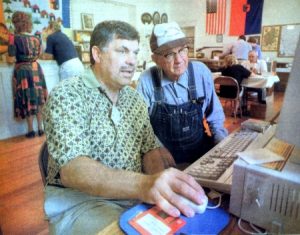Bukovina Germans help trace heritage
Ellis man wants to keep 200 years of history alive for others
By LAURIE MCEWEN
Hays Daily News
Posted with permission of the Hays Daily News, Hays, KS
April 25, 2002
Ray Schoenthaler doesn’t mind talking about his Bukovina German heritage.
In fact, he’s a member of the Bukovina Society of the Americas in Ellis for just that reason: He wants to preserve his heritage for future generations.

A 100 percent” Bukovina German and a board member of the society, Schoenthaler eagerly thumbed through books loaded with information on his fore-bearers – German emigrants from Bukovina- Saturday afternoon during the Bukovinafest in Ellis.
The annual festival ends today.
Schoenthaler said the Bukovina Germans aren’t much different from the Volga Germans – Germans who settled in Russia before coming to the U.S. The Bukovina Germans also moved from Germany to another country – Bukovina – and later left that country for America.
It started when Bukovina, located on the eastern slopes of the Carpathian Mountains in the heart of what was once Austria, needed more people.
To encourage population of the sparse province in the 1770s, Austrian emperors subsidized the emigration of colonists to Bukovina, Schoenthaler said.
People of many different ethnic groups took part in this emigration, including Armenians, Hungarians, Jews, Poles, Romanians and Ukrainians. German colonists came from three distinct areas, southwest Germany, the Czech Republic and Slovakia, he added.
Later, as families grew, farmers no longer had enough land to divide among their children, and industry in Bukovina did not grow to the extent it did elsewhere in the Austrian empire.
When land agents in America enticed the Germans with free homestead land in the 1880s, the settlers emigrated primarily to Ellis; Lewis County, Wash.; Saskatchewan, Canada; and Rio Negro, Brazil. A second wave of emigration took place after World Wars I and II.
Schoenthaler said while descendants of these settlers live in Ellis today, many have lost their understanding of where they originated and what their ancestors experienced.
But Schoenthaler, a fifth-generation Bukovina German whose parents arrived here when they were ages 4 and 8, said he’s noticed that interest is once again on the rise. “My main interest is in keeping the history of 200 years alive for anyone who’s interested in knowing about our heritage.”
And Schoenthaler said Ellis is a good place to do this. “We feel Ellis is one of the largest collections of Bukovina Germans who came from Germany.”
